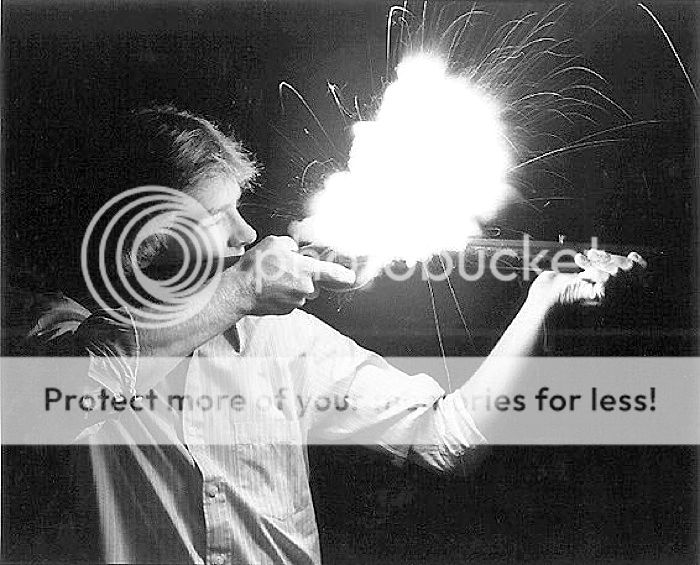There have been some recent interesting discussions about speed in our shooting, speed of 4F vs 3F for priming, speed of large touchholes vs small ones, speed of percussion locks vs flintlocks. That got me to thinking about something which I believe to be true, but which many people assume isn’t. It’s the famous flintlock flinch”¦. because of this....

It can be a serious problem, especially for people new to flintlocks, but it can also be a persistent one for more experienced shooters. From many related discussions over the years I gather that most shooters believe the flinch is a reaction to the flash of the pan right in front of their eyes, as though they are dodging it.
Is that what really happens? There are some numbers which have been generated by various people over the years while testing locks, powders flints, etc. which seem to indicate that a flintlock fires the pan powder in about .04 to .05 second. That’s 40 to 50 milliseconds, thousandths of a second.
Another interesting number is the fastest possible human reaction time, the time it takes a person to respond to any kind of outside stimulus. That’s .11 second. That’s 110 milliseconds.
So, if the pan fires in 40 milliseconds and it takes you more than 110 milliseconds to dodge, there seems to be an inescapable conclusion, flinching which causes you to miss the shot cannot be a reaction to the pan flash. The ball will be well out of the barrel before you can move. If your flinch is making you miss, you have to be starting it before the hammer starts to move or it will be all over before you can move the barrel.
So, flinching is a problem of anticipating the flash and dodging before it even happens. What we all need is to be trained like a good birddog to ”˜stand steady to shot’. :haha:
Spence

It can be a serious problem, especially for people new to flintlocks, but it can also be a persistent one for more experienced shooters. From many related discussions over the years I gather that most shooters believe the flinch is a reaction to the flash of the pan right in front of their eyes, as though they are dodging it.
Is that what really happens? There are some numbers which have been generated by various people over the years while testing locks, powders flints, etc. which seem to indicate that a flintlock fires the pan powder in about .04 to .05 second. That’s 40 to 50 milliseconds, thousandths of a second.
Another interesting number is the fastest possible human reaction time, the time it takes a person to respond to any kind of outside stimulus. That’s .11 second. That’s 110 milliseconds.
So, if the pan fires in 40 milliseconds and it takes you more than 110 milliseconds to dodge, there seems to be an inescapable conclusion, flinching which causes you to miss the shot cannot be a reaction to the pan flash. The ball will be well out of the barrel before you can move. If your flinch is making you miss, you have to be starting it before the hammer starts to move or it will be all over before you can move the barrel.
So, flinching is a problem of anticipating the flash and dodging before it even happens. What we all need is to be trained like a good birddog to ”˜stand steady to shot’. :haha:
Spence




